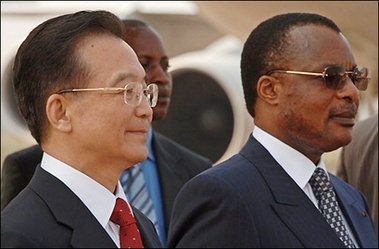LUANDA: China's energy partnership with Africa is based on equality and
mutual benefit, and will not influence any other party, Premier Wen Jiabao said
on Tuesday.
During talks with Angolan President Jose Eduardo dos Santos, Wen said China
is ready to work with Angola and other African countries in the energy sector.
"This is only one part of co-operation between China and Africa in a wide range
of fields," said Wen, who flew from Brazzaville to Luanda on Tuesday afternoon.

Chinese Prime Minister Wen Jiabao
(L) is welcomed by Republic of Congo President Denis Sassou Nguesso, June
19. [AFP] |
Dos Santos said that China has
adopted positions which respond to the development needs of African nations.
Angola is China's second biggest trading partner in Africa, following South
Africa. Trade between the two nations reached US$6.95 billion last year, 41.6
per cent up from the previous year, according to statistics from the Ministry of
Commerce.
Dos Santos said China has established a partnership with Africa aiming to
promote reciprocal co-operation without any preconditions.
Across Angola, Chinese workers are busy rebuilding roads, railways and
technical institutes. The work is financed by a US$2 billion low-interest loan
from China's Export and Import Bank.
One of the key Chinese-funded projects is the reconstruction of the
1,300-kilometre railway from the west coast city of Benguela to Angola's eastern
border with the Democratic Republic of Congo.
Yesterday afternoon, Wen arrived in Cape Town on a two-day official visit to
South Africa, the fifth leg of his seven-nation Africa tour, which has taken him
to Egypt, Ghana, the Republic of Congo, Angola and will also take him to
Tanzania and Uganda.
He is expected to meet South African President Tbabo Mbeki.
Experience in poverty reduction to be shared
China's experience in coping with its own poverty problems will
prove invaluable as the nation struggles to help alleviate poverty in Africa,
said a senior anti-poverty official yesterday.
China is committed to helping Africa combat poverty, and will
share its experience in bringing more than 100 million people out of absolute
poverty over the past three decades, said Zhang Lei, director of the
International Poverty Reduction Centre in China.
As part of the effort, the centre will train about 300
anti-poverty officials each year.
"Most of our trainees will be African," Zhang told China Daily.
Set up last year with the support of the United Nations and World
Bank, the centre plans to launch two half-month workshops for African countries
in the second half of this year.
The first one will start on July 5, and aims to provide case-study
opportunities for about 30 division-chief level officials from about 20 African
countries.
A high-ranking workshop for ministerial-level officials will
follow, starting in September.
"The most important lesson we want to share is the strong resolve
of the government in reducing poverty," said Zhang, who also works for the State
Council Leading Group on Poverty Alleviation.
Nearly half the population of sub-Saharan Africa lives on less
than US$1 a day, and life expectancy is less than 50 years, mainly due to armed
conflicts, AIDS, and inadequate health care and social services.
Along with poverty-reduction aid, China has also encouraged its
companies to expand investment in agriculture, fishing, manufacturing,
infrastructure and resource exploration in "the continent of opportunities."
More than 40 domestic and international experts have compiled an
investment roadmap commissioned by the National Development and Reform
Commission (NDRC).
"We expect China's investment in Africa will gallop in the coming
years," said Shi Yongxiang, a leading expert on the team.
"China's advantages in certain sectors can meet African people's
needs."
China is advanced in agricultural technology, seed cultivation and
oil exploration, and produces inexpensive and durable light industrial products
and machinery. And Chinese enterprises are also competitive in road and railway
building, telecommunications, irrigation and energy, said Shi.
These could meet the needs of many African countries, he said.
Shi's Top-benefit Management and Consultancy Company worked with
more than 40 experts over six months to complete the report in May.
The team suggested China set up cutting edge agricultural
technology demonstration parks in Africa an idea which has been accepted by
China's highest leadership, according to sources with the NDRC.
"This will create a lot of opportunities for China's agricultural
enterprises," said Shi.
In the report, Shi's team emphasized that localization is the most
important guideline for Chinese investors. "The tag 'made in China' should be
changed to 'made in Africa'."
Shi's team suggested China not only become a product producer but
also service provider for Africa.
Economic development in many African countries is at the same
level as it was in China two decades ago, said Shi. "China's development and the
continent's frog-leap growth call for co-operation."
Trade between China and Africa surged to nearly US$40 billion last
year, rising from US$10 billion at the turn of the century.